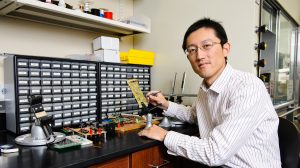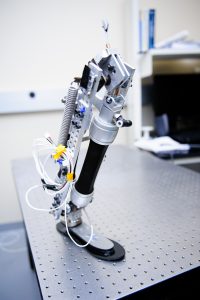
TUSCALOOSA, Ala. — The National Science Foundation selected a University of Alabama mechanical engineering professor for a CAREER Award for his research into a robotic prosthesis that could help amputees walk better.
The CAREER Award is NSF’s most prestigious recognition of top-performing young scientists beginning their careers.
Dr. Xiangrong Shen, assistant professor of mechanical engineering in the UA College of Engineering, was awarded nearly $424,000 to assist his innovative work into biologically-inspired, powered prosthesis that mimic natural joints.
There are more than 400,000 people with a leg amputated below the hip in the United States, and this number is expected to double by 2050, according to Shen.
“The idea is to benefit those amputees to live a higher quality life. That’s the motivation for all these works,” he said.
Most prostheses only dissipate energy, or store and reuse energy in walking. This requires the amputee’s other joints to work harder, causing the amputee to expend more energy and resulting in an often unnatural and asymmetric gait.
There are leg prosthetics that provide energy to an amputee, but they rely on battery-powered motors that can be bulky and heavy. Shen’s approach to robotic prostheses uses rocket fuel, the compound monopropellant, to power an artificial muscle. The pneumatic system replaces the motor used in current powered-prosthetics.
Shen’s system is proving to be lighter, more powerful and more compact than current designs, but work remains.
“This is a relatively new system,” Shen said. “There are some problems in putting the prosthesis into clinical use because the components of the prosthesis are still being developed. In our research, the long-term goal is to develop powered prostheses with comparable appearance and functionality as human limbs.”

As a unique class of liquid fuel, monopropellant releases energy through a chemical reaction called catalytic decomposition, which means the monopropellant decomposes and expands upon contact with a catalyst such as iridium and silver. The reaction produces oxygen and steam that drives a sleeve-muscle actuator, an artificial muscle that replaces a motor. This high-pressure, compact pneumatic system is more durable than a battery-powered motor, according to Shen’s research.
For the amputee to control the artificial muscles, Shen is working on an electrical system that uses existing muscles to move the prosthesis. This electromyography neural interface reads the muscle-activating neural signal by placing electrodes on the surfaces of remaining muscles. Although the joints driven by these muscle have been removed for an amputee, the muscle signal is still there, which can generate the commands to drive the prosthesis.
Shen is also developing a fault-tolerant control structure for the electromyography controls, which is a kind of back-up system that reconfigures the controller in the event of failure to prevent falls.
He has successfully demonstrated the basic concept of the actuator and how to use it to drive a robotic joint, but more research remains before testing can begin.
In 1837, The University of Alabama became one of the first five universities in the nation to offer engineering classes. Today, UA’s fully accredited College of Engineering has more than 4,500 students and more than 120 faculty. In the last eight years, students in the College have been named USA Today All-USA College Academic Team members, Goldwater, Hollings, Portz, Mitchell and Truman scholars.
Contact
Adam Jones, engineering public relations, 205/348-6444, acjones12@eng.ua.edu
Source
Dr. Xiangrong Shen, assistant professor of mechanical engineering, 205/348-6743, xshen@eng.ua.edu